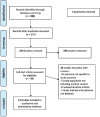Is simulation useful in preparing doctors-to-be for patient death: A narrative review
- PMID: 37727433
- PMCID: PMC10506752
- DOI: 10.4103/jehp.jehp_1559_22
Is simulation useful in preparing doctors-to-be for patient death: A narrative review
Abstract
Clinical and communication skills involved in managing patient death are essential for medical practitioners, yet these skills are often neglected in undergraduate medical education. We aim to review current reported evidence of simulation-based education on medical students' preparedness and performance toward patient death. A narrative review of the literature on simulation-based education for medical students on patient death was conducted. Data on study design, simulation dimension, evaluation tool, and outcome were collected and summarized. Eleven prospective studies were included for narrative review. Simulation modalities included mannequins, standardized patients, and online virtual reality. Heterogeneity in the evaluation tool of simulation-based education was demonstrated. Ninety percent of studies concluded positive outcome of simulation on improving medical students' preparedness in patient death. No negative or adverse learner reaction was reported. Simulation-based education may safely improve medical students' competence in handling patient death. Current data and evaluation tools of education outcomes are sparse and heterogeneous. Future research is encouraged to explore this under-researched topic, amid increasing interest in the use of simulation in medical education.
Keywords: Health communication; palliative treatment; patient care; patient simulation; undergraduate medical education.
Copyright: © 2023 Journal of Education and Health Promotion.
Conflict of interest statement
There are no conflicts of interest.
Figures
Similar articles
-
Effectiveness of high fidelity simulation versus low fidelity simulation on practical/clinical skill development in pre-registration physiotherapy students: a systematic review.JBI Database System Rev Implement Rep. 2019 Jun;17(6):1229-1255. doi: 10.11124/JBISRIR-2017-003931. JBI Database System Rev Implement Rep. 2019. PMID: 30964770
-
Student and educator experiences of maternal-child simulation-based learning: a systematic review of qualitative evidence protocol.JBI Database System Rev Implement Rep. 2015 Jan;13(1):14-26. doi: 10.11124/jbisrir-2015-1694. JBI Database System Rev Implement Rep. 2015. PMID: 26447004
-
Interventions for improving medical students' interpersonal communication in medical consultations.Cochrane Database Syst Rev. 2021 Feb 8;2(2):CD012418. doi: 10.1002/14651858.CD012418.pub2. Cochrane Database Syst Rev. 2021. PMID: 33559127 Free PMC article.
-
Standardized Patients in Medical Education: A Review of the Literature.Cureus. 2023 Jul 17;15(7):e42027. doi: 10.7759/cureus.42027. eCollection 2023 Jul. Cureus. 2023. PMID: 37593270 Free PMC article. Review.
-
Use of high-fidelity simulation to improve communication skills regarding death and dying: a qualitative study.BMJ Support Palliat Care. 2016 Dec;6(4):474-478. doi: 10.1136/bmjspcare-2015-001081. Epub 2016 Jun 17. BMJ Support Palliat Care. 2016. PMID: 27316636
References
-
- Iacobucci G. Covid-19: Medical schools are urged to fast-track final year students. BMJ. 2020;368:m1064. - PubMed
-
- Siddique H. Final-Year Medical Students Graduate Early to Fight Covid-19. United Kingdom: The Guardian; 2020.
-
- Gibbins J, McCoubrie R, Forbes K. Why are newly qualified doctors unprepared to care for patients at the end of life? Med Educ. 2011;45:389–99. - PubMed
Publication types
LinkOut - more resources
Full Text Sources


